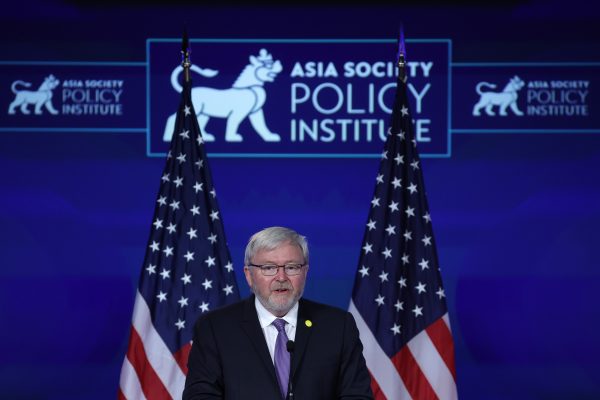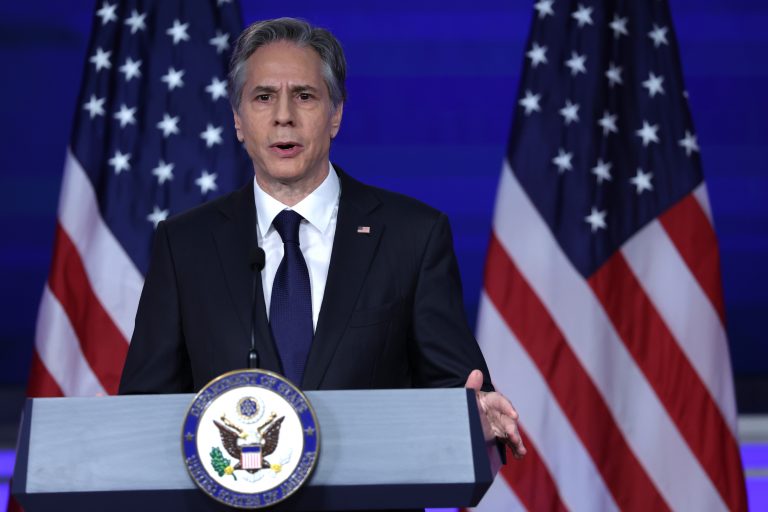After over a year in office, the Biden administration has unveiled its “Approach to the People’s Republic of China” in remarks given by Secretary of State Antony Blinken on Thursday, May 26 in Washington, D.C.
In the Approach, Blinken articulated the administration’s stance on China as part of a mission to “defend and reform the rules-based international order.”
The state secretary condemned Xi for leading the Chinese Communist Party (CCP) to become “more repressive at home and more aggressive abroad,” but stressed that though the United States would work to “shape the strategic environment around Beijing,” the Biden administration is not looking to prevent China’s rise, promote Taiwan independence, or enter a new Cold War.
Speaking at the George Washington University, the top U.S. diplomat’s address was prefaced by a speech given by Australian former prime minister and shadow minister of foreign affairs Kevin Rudd.

Defending the ‘rules-based international order’
While criticizing Russia and its president Vladimir Putin for the ongoing war in Ukraine, Blinken singled out China as “the only country with both the intent to reshape the international order and, increasingly, the economic, diplomatic, military, and technological power to do it.”
Success
You are now signed up for our newsletter
Success
Check your email to complete sign up
The Biden administration, Blinken said, “will remain focused on the most serious long-term challenge to the international order – and that’s posed by the People’s Republic of China” (PRC).
Don Tse, lead researcher at the New York-based political risk consultancy SinoInsider, described the Approach as “underwhelming,” especially as compared with the China policy of the former Trump administration.
“At first glance, Blinken’s speech seems to have brought over some concepts from the Trump administration and [former Secretary of State] Mike Pompeo,” Tse told Vision Times in written comments. These include criticizing China’s government while praising its people, as well as continuing to voice support for oppressed groups in the PRC.
But the analyst noted that there was no mention of the CCP’s Marxist-Leninist ideology in Blinken’s speech, and that his assurance that the U.S. was not looking to change China’s system “undermines his calls for reform.”
A complicated relationship
Blinken characterized the PRC as an important partner, describing the US-China relationship as “one of the most complex and consequential relationships of any that we have in the world today.”
Decades of cross-Pacific ties — and “the stability and opportunity that the international order provides” — allowed China to grow from an impoverished isolated country to “a global power with extraordinary reach, influence, and ambition,” he said, while praising the “talent, ingenuity,” and “hard work of the Chinese people.”
“China is also integral to the global economy and to our ability to solve challenges from climate to COVID,” he said. “Put simply, the United States and China have to deal with each other for the foreseeable future.”
However, Blinken warned that “rather than using its power to reinforce and revitalize” the international rules, “Beijing is undermining them.”
“Under President Xi, the ruling Chinese Communist Party has become more repressive at home and more aggressive abroad,” he said, noting the persecution faced by Uyghur and Tibetan minority ethnicities, as well as the CCP’s mass surveillance technology, which Beijing has exported to 80 countries.
Invest, align, compete
The Biden administration’s Approach calls for the U.S. to compete with the PRC, while leveraging America’s alliances and partnerships to “shape the strategic environment around Beijing,” Bliken said, summing up the strategy as “invest, align, compete.”
This will help the U.S. “defend our interests and build our vision for the future,” he said, adding that the United States’ strengths of free expression, innovation, and material wealth would help it outdo China’s authoritarian system.
Blinken also drew some distinction between the Chinese people and the regime:
“We have profound differences with the Chinese Communist Party and the Chinese Government. But those differences are between governments and systems – not between our people,” he said.
However, “and to the people of China: we’ll compete with confidence; we’ll cooperate wherever we can; we’ll contest where we must. We do not see conflict.”
At the same time, Blinken stressed that the Biden administration was not trying to confront the CCP, saying that while the U.S. would seek to demonstrate the superiority of democracy, “we do not seek to transform China’s political system.”
“Blinken’s remarks are clearly weaker than Pompeo’s ‘China Challenge’ speech” given in 2019, which explicitly called out the CCP as a communist party seeking “international domination” and the destruction of freedom, Tse, the SinoInsider analyst, said.
Pompeo had said in that speech and in later remarks that either the U.S. must change China, or else the CCP would change America, something totally absent from the Biden administration’s Approach.
“Blinken does make some more attempts to call out the CCP and PRC, as opposed to the Chinese people, but it completely avoids the issue of communist ideology, or that the Party is a Marxist-Leninist regime,” Tse said. “The Biden administration treats Communist China as a normal state, and blames Xi Jinping for its abuses.”














